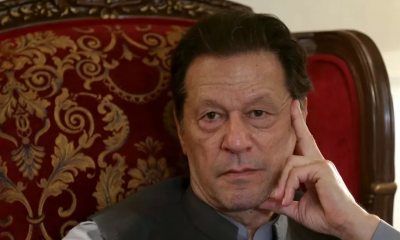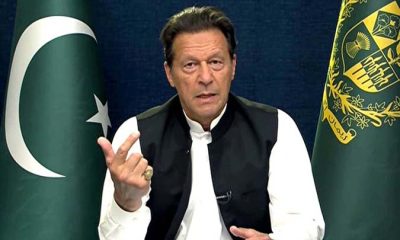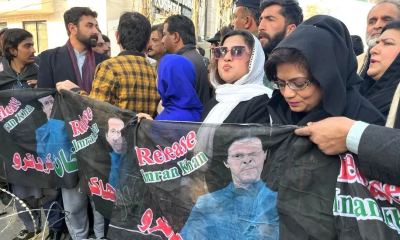Latest News
Pakistan election: PTI joins religious parties, PPP backs rival PMLN

Five days after Pakistan’s general election, two opposing parties, Pakistan Tehreek-e-Insaf (PTI) and Pakistan Peoples Party (PPP), have both announced plans to form a government – with the PTI allying with religious parties and the PPP forming a coalition with rival Pakistan Muslim League-Nawaz (PMLN).
The PTI leadership on Tuesday announced that its independent candidates would try to form a federal government and one in Punjab province by joining a coalition with the minority party Majlis-e-Wahdat-Muslimeen (MWM).
The party also said its candidates in Khyber Pakhtunkhwa province would ally with another religious party, Jamaat-e-Islami (JI), to form a government.
Thursday’s elections delivered a split mandate with no party securing a majority in the National Assembly. Independent candidates affiliated with jailed former Prime Minister Imran Khan’s PTI won the most seats. But to form a government, they still need to be part of a political party or a coalition.
In announcing the coalition plan on Tuesday, PTI spokesperson Raoof Hasan said he had been mandated by Khan to approach all political parties other than the “PPP, PMLN and MQM”, or Muttahida Qaumi Movement.
“Imran Khan has a clear message that formation of a government is the right of who had won the elections,” Hasan said at a press conference in Islamabad.
Former cricketer Khan was ousted from power in a parliamentary vote of no confidence in April 2022. The PTI was also forced to field its candidates as independents after its electoral symbol, a cricket bat, was stripped from it in January for violating election laws.
Khan has maintained he will not engage with three-time former Prime Minister Nawaz Sharif’s PMLN or former Foreign Minister Bilawal Bhutto-Zardari’s PPP, calling them “corrupt”.
In Thursday’s polls, PTI-backed candidates emerged on top with 93 seats in the National Assembly whereas the PMLN was the single biggest party with 75 seats. The PPP was the third highest with 54 seats. To form a government, a party or coalition needs a simple majority of 134 seats in the National Assembly out of the 266 that were voted on during the general election.
Besides the 266 directly elected seats, an additional 60 seats are reserved for women and 10 for minorities. Those seats are distributed among parties according to the ratio of seats they won, but independents will not receive these quota seats.
While two parties can form a coalition and still retain their individual identity and policies, independent candidates, once they join a party, must adhere to that party’s discipline and decisions.
The PTI has insisted that its singular majority was stolen in the election due to alleged tampering and vote manipulation. Barrister Gohar Ali Khan, the PTI’s interim party chief, said on Tuesday that the PTI believes it has won 180 seats, instead of 93. “We will share a white paper with all the details,” he added. Neither Hasan nor Gohar Ali Khan said who would be the party’s candidates for prime minister, speaker and deputy speaker in parliament.
Coalition between PPP and PMLN
Hours after the PTI’s announcement, the PPP and PMLN said at a press conference that they would form a new coalition and join with smaller parties to lead the country.
Although they did not specify who would lead the government, PMLN spokesperson Marriyum Aurangzeb said on the social media platform X that Nawaz Sharif had nominated his younger brother and Former Prime Minister Shehbaz Sharif for the post.
Earlier on Tuesday, Bhutto-Zardari, the PPP chairperson, said his party would endorse the PMLN’s candidate for the position of prime minister and would align with it.
He said the PPP decided against taking any role in the cabinet, and he would not be putting his name forward for the premiership, “We do not have the mandate to form a government in the federation, and therefore, I will not be putting myself forward for the candidacy of the prime minister,” he said during a press conference in Islamabad.
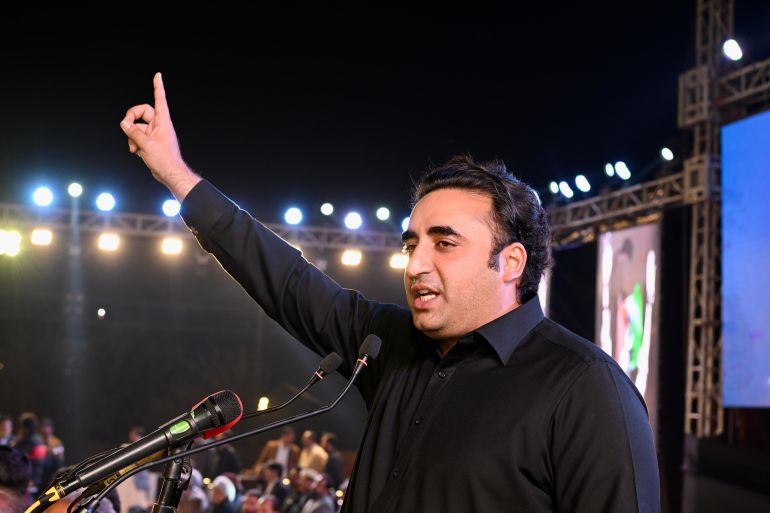
Bhutto-Zardari expressed his desire to see his father, former President Asif Ali Zardari, return to that position while also announcing the party would put candidates forward for Senate chairperson and speaker of the National Assembly.
“We ran this election on the manifesto based on public importance, and we want to restore political stability and want to end this environment of political toxicity,” the PPP chairperson said.
Political analyst Benazir Shah said the decision by the PPP seems to be a smart move. “The PPP has been trying to make inroads into Punjab, Pakistan’s most populous province, for the past few years. This is an opportunity for them to spend the next five years mobilising their party in the province, especially since these election results show weakening of PMLN’s vote bank,” she told Al Jazeera. “The PPP has its eyes set on 2029, not on 2024.”
Regarding the PTI, analyst Mehmal Sarfraz said it was incumbent on the party to ensure its winning candidates join the MWM so party discipline applies to them and they cannot jump ship.
However, she questioned Imran Khan, for refusing to engage with other political parties.
“This is not about any principle. This is about Khan’s narrative of hate against these parties and his divisive politics. It is unfortunate that PTI is not willing to talk to any other mainstream political party. Democracy is also about co-existence and tolerating other’s point of view, but PTI’s politics is essentially ‘either with us or against us’,” she told Al Jazeera.
Shah concurred, saying that while the election results show that Pakistani voters want to see the PTI in office, it appears Khan is still adamant on “politics of confrontation”.
“His refusal to sit with the PPP to form a government signals that Khan is still not ready to sit with political parties in the larger interest of democracy,” she added.
Sarfraz believes that, given the circumstances, the PPP made the right call by joining the PMLN alliance, adding that it is the PMLN that needs the PPP, not the other way around.
“No party has the numbers to form a government on its own. Ideally, the PPP would have wanted Bilawal Bhutto-Zardari to be the leader of the opposition. But options are limited, especially because of the PTI’s rigid stance. So this is effectively the only thing they could have done,” the Lahore-based analyst said.
(Aljazeera)
Latest News
Winless Afghanistan look to keep slim hopes alive against upbeat UAE

How do you lift yourself after a soul-crushing defeat? Because Afghanistan need to do exactly that after going down to South Africa in the double Super Over in Ahmedabad. It was their second defeat in as many games, and even though they are the favourites for their remaining two group games – against UAE and Canada – their T20 World Cup campaign is hanging by the thinnest thread of hope.
Afghanistan have an 11-3 win-loss record against UAE, their opponents for Monday’s day game in Delhi. But a New Zealand win over Canada the following day is enough to knock them out.
UAE must be feeling confident after their win over Canada. It came in Delhi, where they play their remaining two group games as well. But they too rely heavily on Canada beating New Zealand. If New Zealand beat Canada, which is more likely, UAE will have to pull off a series of miracles. They will have to beat Afghanistan and then South Africa, who have been unbeaten so far. And they will have to do so by such margins that their net run rate goes above New Zealand’s. That gap, at the moment, is huge.
So, how do Afghanistan and UAE proceed? Perhaps, as players often say, by taking one game at a time.
Ibrahim Zadran is a perfect foil for the attacking Rahmanullah Gurbaz. While the role of the anchor in T20 cricket is diminishing every second, things are different at T20 World Cups. Moreover, Zadran has upped his intent of late. Two of his four 50-plus scores since October came at a strike rate of more than 150. However, he has managed only 22 runs off as many balls in two outings so far. Afghanistan expect much more from him.
Born in Bihar, graduated from Jamia Millia Islamia and now playing for UAE, Sohaib Khan showed against Canada how destructive he can be. His 29-ball 51, laden with four fours and four sixes, turned UAE’s fortunes around. But this was not the first time his hitting prowesses were on display. At the Rising Stars Asia Cup in November, he had smashed 63 off41 balls against India A in Doha. In that game, he had taken 24 runs off eight balls against Suyash Sharma. Can he repeat those heroics on Monday?
Both teams are likely to go with unchanged XIs.
Afghanistan (probable): Rahmanullah Gurbaz (wk), Ibrahim Zadran, Gulbadin Naib, Sediqullah Atal, Darwish Rasooli, Azmatullah Omarzai, Mohammad Nabi, Rashid Khan (capt), Mujeeb Ur Rahman, Noor Ahmad, Fazalhaq Farooqi
UAE (probable): Aryansh Sharma (wk), Muhammad Waseem (capt), Alishan Sharafu, Mayank Kumar, Harshit Kaushik, Sohaib Khan, Muhammad Arfan, Muhammad Farooq, Haider Ali, Junaid Siddique, Muhammad Jawadullah
[Cricinfo]
Latest News
Kishan’s sensational 77 floors Pakistan and puts India in Super Eights
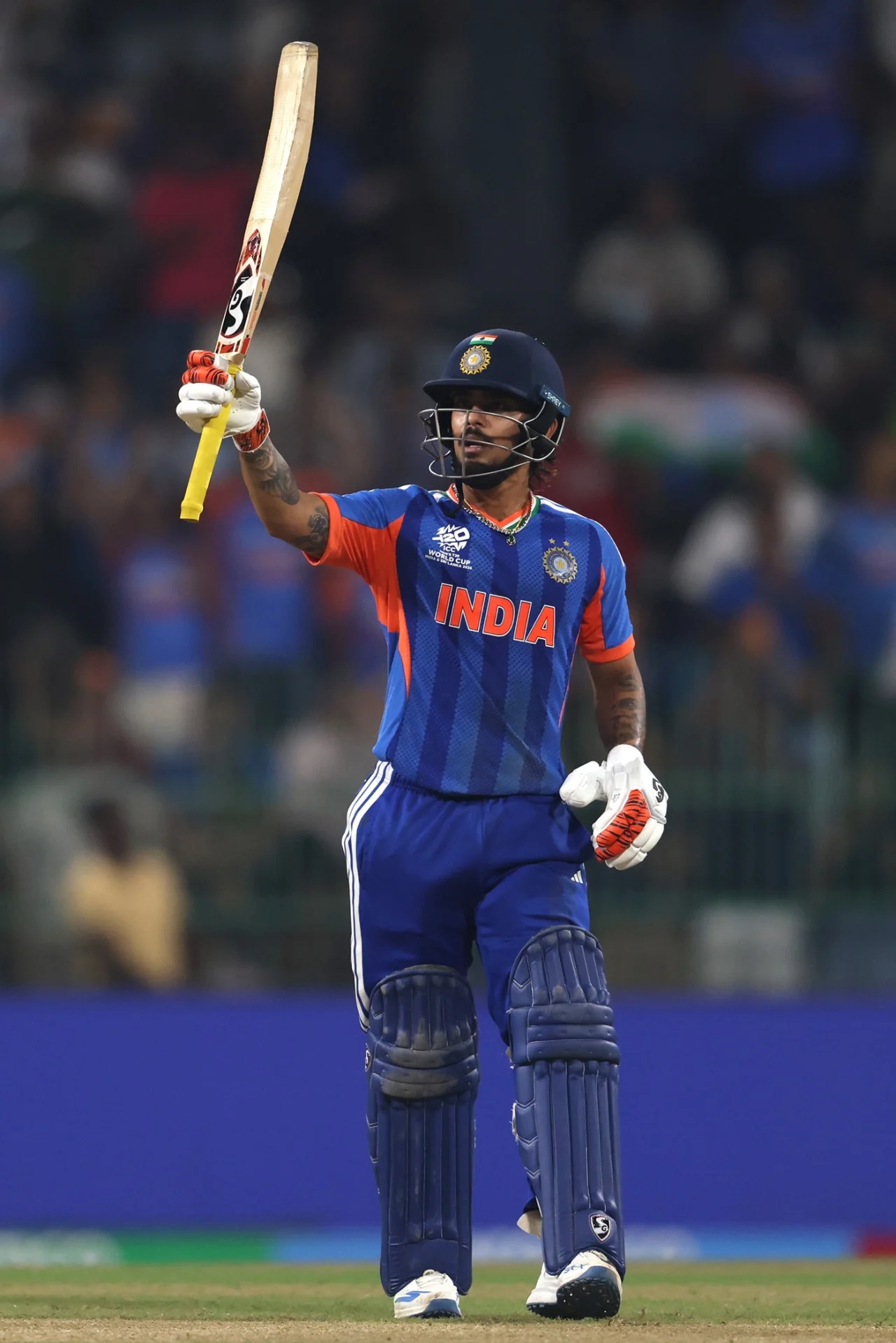
A sensational 77 off 40 balls from Ishan Kishan on a slow, spin-friendly pitch helped India make it 8-1 against Pakistan in T20 World Cups and seal their place in the Super Eights. The surface at the R Premadasa Stadium was so tacky that Pakistan bowled 18 overs of spin after sticking India in, but Kishan rose above the conditions to take India to what looked like 30 above par. With three wickets in the first two overs, Hardik Pandya and Jasprit Bumrah vindicated that feeling as India registered their biggest T20I win against Pakistan.
The impact of Kishan’s innings – after Salman Agha opened the bowling to get Abhishek Sharma for a duck – was clear from plain numbers. The rest of the India innings, including extras, managed just 98 off 80 balls, which was much closer to being representative of the conditions. As was Pakistan’s innings, which went at over a run a ball only thanks to Usman Khan’s 44 off 34.
It is a no-brainer to bowl offspin against two left-hand openers on a slow surface, but the choice of the bowler was surprising: Agha, and not Saim Ayub. Even with the new ball, turn and lack of pace was obvious, resulting in one run off first five balls and a second duck in two innings for Abhishek in his World Cup career.
This is only the second month of the year, and nothing rode on this match in terms of progression in the tournament, but this is an early contender of the innings of the year just because of how much better Kishan was than the average better on this surface. Shaheen Shah Afridi had the right idea to bowl into the surface even with the new ball, but the quick hands and low height of Kishan turned the first ball into a dismissive pull over forward square leg for a six. Then he hit Agha over mid-on against the turn.
A lot of focus has been around Usman Tariq, but Pakistan’s main spinner for long has been Abrar Ahmed with his mix of offbreaks and carrom balls. Kishan didn’t let him settle, sweeping him first ball for six.
Despite the first over ending at 1 for 1, Kishan owned the powerplay, taking India to 52 for 1, which was absolutely essential before the field spread out. The easing of field restrictions didn’t matter to Kishan, who steered the first ball after the powerplay for four. Then he hit Abrar right over his head. Then drove him over extra-cover. The second of these fours brought up his fifty in just 27 balls.
Curiously, despite having an offspinner and two mystery spinners who can turn the ball away from the left-hander, Pakistan went to Shadab Khan’s legspin against two left-hand batters in the eighth over, and paid with 17 runs. By the time Ayub dismissed Kishan, one ball after a reverse-pull for four, he had scored 77 out of 88 in 8.4 overs.
Suryakumar Yadav and Tilak Varma seemed content to play within themselves, the first sign that India knew Kishan had done something special and all they needed to do was preserve their position. They added 38 off 33, including a first-ball four off Tariq, but when they decided to go again in the 15th over, Ayub proved to be a difficult proposition. He got Tilak on the sweep, Hardik for a golden duck, and nearly bowled Shivam Dube with the hat-trick ball. The amount of turn he got indicated India were still ahead in the game.
It was the return of Abrar and Afridi in the 18th and 20th overs that gave India the opportunity to achieve a final kick. Dube and Rinku Singh took the opportunity with 27 off 17 and 11 off 4. Between them, Afridi, Abrar and Shadab went for 86 in six overs, poor returns for the surface.He might have scored a golden duck in trying to impose himself on the game, but with the ball Hardik was meticulous. No driving length, no room, three dots, and out came the low-percentage pull for a four-ball duck for Sahibzada Farhan, Bumrah cashed in on the pressure of a first-over wicket maiden with swing and hard lengths to send back Ayub and Agha. Babar Azam missed a slog sweep off Axar Patel to make it 34 for 4 in 4.5 overs.The game was all but over but Usman Khan kept Pakistan interested with the innings that came closest to Kishan’s in terms of ease. He hit Pandya for a six and then took 27 off 15 balls from Axar with two inside-out fours and two through straight long-off after charging him. However, Axar had his own back when he saw Usman coming, fired one in, and fittingly Kishan was there to practically seal the win for India. Only formalities remained thereafter
Brief scores:
India 175 for 7 in 20 overs (Ishan Kishan 77, Tilak Varma 25, Suryakumar Yadav 32, Shivam Dube 27, Rinku Singh 11*; Salman Agha 1-10, Shaheen Shah Afridi 1-31, Saim Ayub 3-25, Usman Tariq 1-24) beat Pakistan 114 in 18 overs (Usman Khan 44, Shadab Khan 14, Faheem Ashraf 10, Shaheen Shah Afridi 23*; Hardik Pndya 2-16, Jasprit Bumrah 2-17, Varun Chakravarthy 2-17, Axar Patel 2-29, Kuldeep Yadav 1-14, Tilak Varma 1-11) by 61 runs
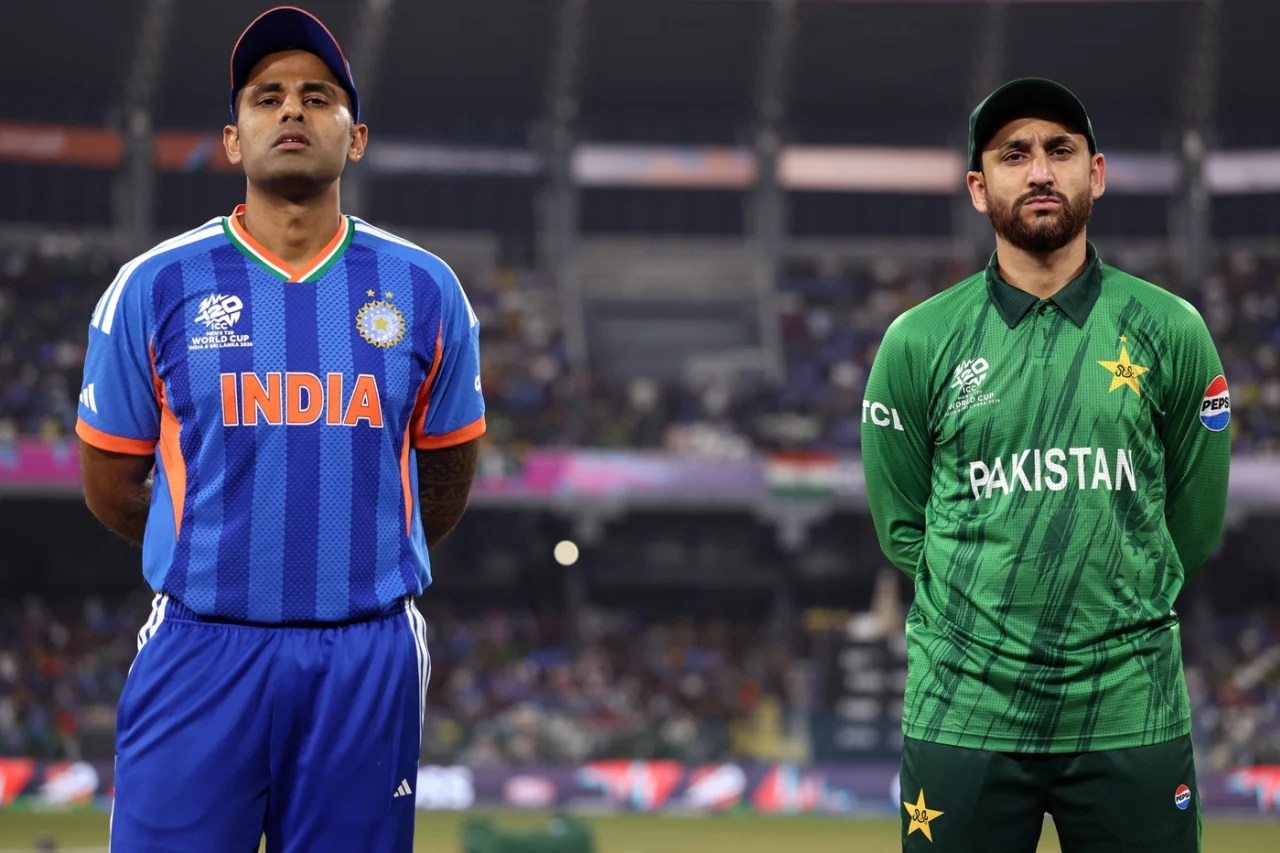
Suryakumar Yadav and Salman Agha did not shake hands at the toss [Cricinfo]
Latest News
Australia on brink as Sri Lanka eye Super Eights spot
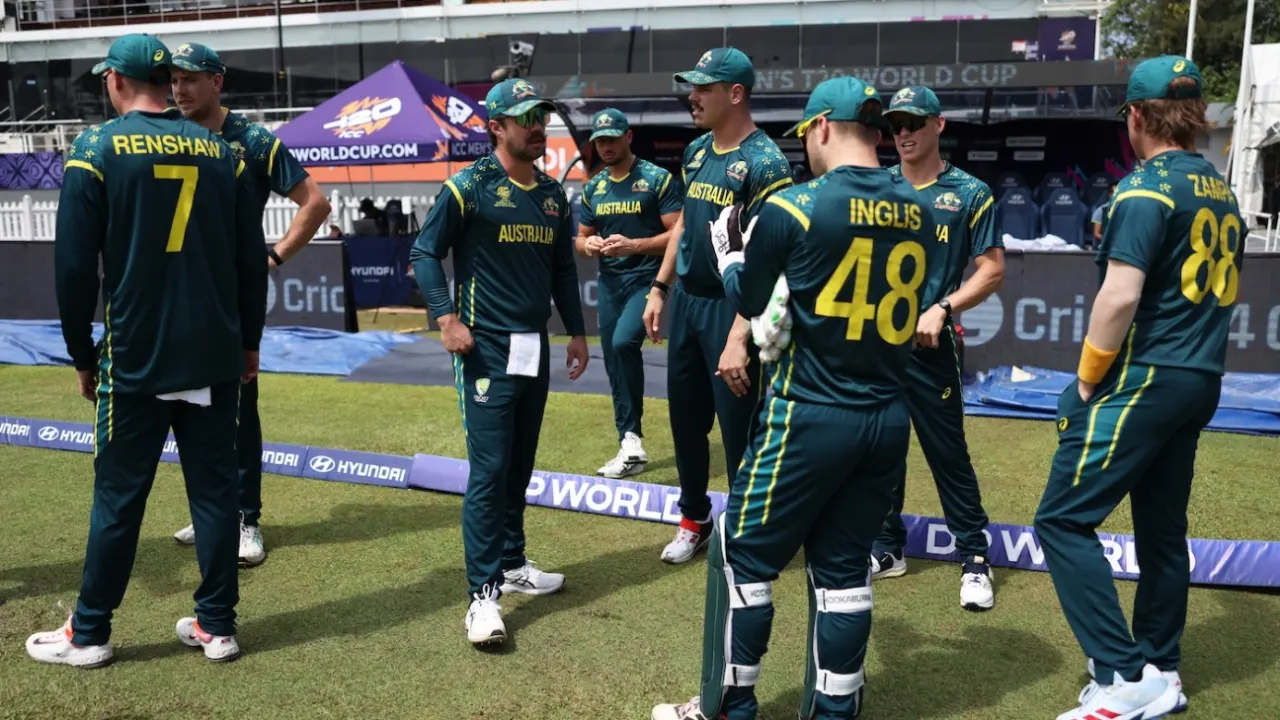
Australia have no room for error now. Mathematically they won’t be eliminated with a defeat against ri Lanka, but it would leave them needing something close to a miracle. For Sri Lanka, the stakes aren’t quite as high, but with a confident Zimbabwe as their last opposition in the group stage they would ideally not want to leave their fate uncertain. A win would lock them into the Super Eights.
T20 World Cups hold an odd position in Australia men’s cricket. Poor ones, of which there have been a few over the years, don’t really lead to calls for wholesale changes that defeats in marquee Tests can do or underperforming ODI World Cup campaigns (as rare as they are). But it’s fair to say, more people are now engaged with Australia’s fortunes following the ;oss to Zimbabwe. A group stage exit would be a significant failure.
The initial fallout to that loss has raised questions about both the batting and bowling. Only taking two wickets has shone a light on a lack of strike power, particularly when Adam Zampa is kept quiet, but in truth Australia should still have been able to chase 170 given their whole T20 philosophy over the last 18 months has been the depth and power of the order. With form questions over a few players coming in, and lack of cricket for others, the injury to Mitchell Marsh was especially untimely.
Sri Lanka had enough to get past Ireland (aided by the latter’s fielding) and were comfortably too strong for Oman. That contest was a nice ego boost for the batting with Kusal Mendis, Pavan Rathnayake and the under-pressure captain Dasun Shanka flaying half-centuries. In their opening game, Kamindu Mendis had produced an eye-catching display. They certainly have the tools to cause Australia’s undermanned attack problems.
These two sides have not played each other in a T20I since the 2022 World Cup when Marcus Stoinis hunted down the target with an 18-ball 59. And while no one is really an unknown in international cricket these days given the franchise game and accessibility of footage, it is worth noting Australia have never faced Matheesha Pathirana, this generation’s slinger, although in all T20s only Marsh from a potential top order has been dismissed by him. Glenn Maxwell has 26 runs off ten balls against him, Tim David 21 off 12.
Left-arm spin-bowling allrounder Sunith Wellalage has yet to play a T20I against Australia, but in ODIs he has had quite the time of it with 16 wickets at 20.12 from eight matches which included making his debut as a 19-year-old in 2022. Eleven of those wickets have come at the Premadasa, in five matches, compared to four in two games at Pallekele, but Australia have not always combated left-arm spin well. He has started the tournament with tidy figures of 1 for 28 and 1 for 17. He shapes as even more important given the tournament ending injury to Wanidu Hasaranga and the uncertain form of Dushan Hemantha who went for 45 against Oman.
Tim David’s elevation up the order was a key part of Australia’s planning for this tournament during 2025 when their T20 game clicked nicely. But the hamstring injury he picked up on Boxing Day for Hobart Hurricanes put a spanner in works because it has left David short of match time. He wasn’t ready for the series in Pakistan and was left out against Ireland. Facing Zimbabwe, he picked out short fine leg second ball as part of the powerplay collapse. If Australia are to go deep in this tournament, David will need to fire.
Sri Lanka have a couple of issues to ponder. One is whether they stick with Hemantha or bring in an extra seamer, Pramod Madushan. Another option would be to alter the balance of the side and include Charith Asalanka as a spin-bowling allrounder. Kamil Mishara’s spot could be under pressure after a couple of low scores with Kusal Perera an alternative.
Sri Lanka (possible) Pathum Nissanka, Kamil Mishara, Kusal Mendis (wk), Pavan Rathnayake, Dasun Shanaka (capt), Kamindu Mendis, Dunith Wellalage, Dushan Hemantha/Charith Asalanka, Dushmantha Chameera, Maheesh Theekshana, Matheesha Pathirana
The word from the Australia camp is that Marsh has improved and could come into contention but he will have to get through training on Sunday. Stoinis has avoided serious injury after the blow to the hand while bowling against Zimbabwe. Steven Smith is now with the squad but has not been officially added, although there is still time before facing Sri Lanka. If Marsh is fit, a big call will need to be made on who misses out given Matt Renshaw has impressed. It could come down to between Glenn Maxwell and Cameron Green unless the selectors opt for just three specialist bowlers.
Australia (possible) Mitchell Marsh (capt), Travis Head, Josh Inglis (wk), Tim David, Matt Renshaw, Marcus Stoinis, Glenn Maxwell, Xavier Bartlett, Nathan Ellis, Adam Zampa, Matt Kuhnemann
[Cricinfo]
-

 Life style1 day ago
Life style1 day agoMarriot new GM Suranga
-

 Midweek Review5 days ago
Midweek Review5 days agoA question of national pride
-

 Business5 days ago
Business5 days agoAutodoc 360 relocates to reinforce commitment to premium auto care
-

 Features1 day ago
Features1 day agoMonks’ march, in America and Sri Lanka
-

 Opinion4 days ago
Opinion4 days agoWill computers ever be intelligent?
-

 Features1 day ago
Features1 day agoThe Rise of Takaichi
-

 Features1 day ago
Features1 day agoWetlands of Sri Lanka:
-

 Midweek Review5 days ago
Midweek Review5 days agoTheatre and Anthropocentrism in the age of Climate Emergency


